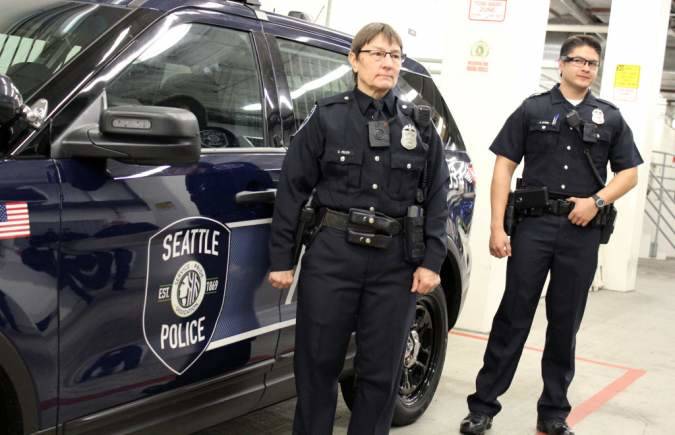Seattle Mayor Ed Murray Monday signed an executive order putting body cameras on patrol cops in the West Precinct (headquartered in Belltown). Bike officers will starting wearing them on July 22 and the rest of the precinct’s patrollers on September 30. Police at the rest of the precincts will get the body cameras on a month-by-month basis.
The policy of police filming public interaction is a response to longstanding yet growing concern among the public and Seattle’s leaders about accountability and police violence. If a camera is recording police/public interactions, the argument goes, then both parties have more incentive to behave well, and if there is violence, the video will settle any dispute over who did what.
But Shankar Narayan of the state ACLU warns that without stronger protections for privacy and against abuse, body cameras could be a Trojan Horse. “The SPD rules” for body camera use, he says, “raise a lot of concern. They give officers tremendous amounts of discretion” about when to turn the camera on and off. “We think the end result is that any failure to record an incident could be justified,” he says.
“Concerns were raised repeatedly” by citizens during prior discussions of the body cameras, says Narayan. For example, the Community Police Commission (which exists to make police reform recommendations based on community input) has repeatedly recommended that body cameras not be deployed beyond a pilot basis “until and unless state public disclosure laws are modified to address complex privacy and safety concerns.”
Then again, U.S. Federal Judge James Robart, who is overseeing Seattle’s compliance with a federal consent decree over police reform, has made body cameras a priority. Speaking to The Seattle Times, Murray said his executive order was issued in part to appease Robart. And the shooting death of Charleena Lyles by two officers who had microphones but not body cameras has sparked increased interest in deploying the technology across the city.
“This level of accountability is good for both officers and the public, and will help build trust in a time where the community, particularly the African American community, is hurting,” Murray said in a press release.
Until Monday’s announcement, the rollout of body cameras had been subject to both negotiations with the Seattle Police Officers Guild and council proceedings—where issues like privacy were being discussed. Murray’s order jettisoned those talks.
“We have taken far too long to fully implement the body camera program due to legislative gridlock—it is past time to move forward,” Murray said in his announcement.
But Narayan says the privacy concerns they and others were raising are real—but also fixable.
“We’re talking about a future where you approach me, you’re wearing a camera with facial recognition,” says Narayan, “and then you as the officer get maybe suspect-based metrics like criminal history or social media postings, or you may just get a threat score that says that this guy is dangerous” based on some secret algorithm owned by body cam provider Axon (formerly Taser).
Narayan also warns of feds snagging data from police body cameras for facial recognition analysis similar to the software that already automatically recognizes people’s faces in pictures on Facebook. “You’re going to be creating a large trove of data that the federal government could potentially…use for immigration enforcement purposes,” he says. Even if the feds aren’t competent enough to set up such a program, it’s a good bet that companies like Axon will be offering to sell them one before too many years.
How to fix the cameras? “Take away officer discretion from turning cameras on and off,” says Narayan, for starters, and then figure out some way to deal with the myriad privacy concerns that comes with mass police video surveillance of the populace. Like, say, making body cam footage typically inadmissible for prosecutions of non-police.
cjaywork@seattleweekly.com
This post has been edited.








